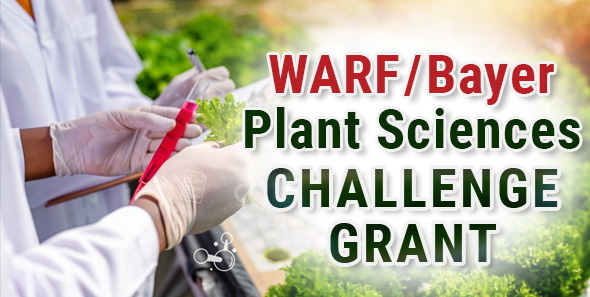$145K in grant funds to advance new solutions to create resilient and secure food systems
CONTACT:
Jeanan Yasiri Moe
Director of Strategic Communications and Public Affairs
[email protected] | (608) 960-9892
MADISON, Wis. – The Wisconsin Alumni Research Foundation and Bayer are pleased to announce that five projects have been selected to receive development funding through the Plant Sciences Challenge Grant.
The grant invited submissions for new technologies focused on novel solutions to fortify our food systems. From advanced pest management to precision agriculture, these projects have the potential to improve crop production throughout Wisconsin and beyond.
“We were impressed by the proposals submitted by University of Wisconsin scientists and are excited to move forward with the funding of these five awardees,” says Dan Ruzicka, Innovation Sourcing Lead for Bayer’s Crop Science Division. “We look forward to developing science-based partnerships with each of these labs to enable the translation of high-potential technology innovation towards solutions for challenges facing agriculture today and into the future.”
The selected projects are led by the following teams:
- Emily Bick (Entomology) for bugPulse: a 3D Insect Scanner
- Quentin Dudley (Chemical & Biological Engineering) for Genomic Architectures for Consistent Expression of Multiple Transgenes in Plants
- Jason Kwan (Pharmacy), Jo Handelsman (Plant Pathology) and Christine Mlot (Pharmacy) for Novel Biological Control and Biopesticide(s) Derived from a Cool-Temperature Bacterium to Combat Pathogenic Oomycetes
- Bhuvana Krishnaswamy (Electrical & Computer Engineering) and Mallika Nocco (Biological Systems Engineering) for Wire-Free Water Management: In-Situ Soil Moisture Sensing with Buried Battery-Less Tags
- Marisa Otegui (Botany) and Sushmita Roy (Biostatistics & Medical Informatics) for Manipulating Autophagy to Enhance Nutrient Utilization and Crop Resilience
“UW-Madison researchers are developing innovative strategies to strengthen our food systems, ensuring they are both resilient and secure,” says Erik Iverson, CEO of WARF. “We’re pleased to collaborate with an industry partner, recognizing and supporting their efforts to ensure a steady supply of safe, accessible food for everyone.”
Projects not selected for funding through the Accelerator Challenge Grants may still be connected to other supportive resources within WARF.
About WARF
The Wisconsin Alumni Research Foundation (WARF) helps steward the cycle of research, discovery, commercialization and investment for the University of Wisconsin–Madison and provides annual support to the university to advance research and innovation. Founded in 1925 as an independent, nonprofit foundation, WARF manages more than 2,000 patents and an investment portfolio as it funds university research, obtains patents for campus discoveries and licenses inventions to industry. For more information, visit warf.org and view WARF’s Cycle of Innovation.
About Bayer
Bayer is a global enterprise with core competencies in the life science fields of health care and nutrition. In line with its mission, “Health for all, Hunger for none,” the company’s products and services are designed to help people and the planet thrive by supporting efforts to master the major challenges presented by a growing and aging global population. Bayer is committed to driving sustainable development and generating a positive impact with its businesses. At the same time, the Group aims to increase its earning power and create value through innovation and growth. The Bayer brand stands for trust, reliability and quality throughout the world. In fiscal 2023, the Group employed around 100,000 people and had sales of 47.6 billion euros. R&D expenses before special items amounted to 5.8 billion euros. For more information, go to www.bayer.com.
###
